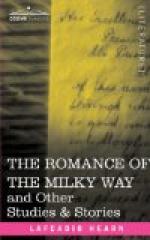[Having vanished at daybreak
(that Snow-Woman), none
could say whither she had
gone. But what had seemed to be a
snow-white woman became indeed
a willow-tree!]
[Footnote 37: The term shirayuki, as here used, offers an example of what Japanese poets call Keny[=o]gen, or “double-purpose words.” Joined to the words immediately following, it makes the phrase “white-snow woman” (shirayuki no onna);—united with the words immediately preceding, it suggests the reading, “whither-gone not-knowing” (yuku [’e] wa shira[zu]).]
Yuki-Onna
Mit[’e] wa yasathiku,
Matsu wo ori
Nama-dak[’e] hishigu
Chikara ari-keri!
[Though the Snow-Woman
appears to sight slender and gentle,
yet, to snap the pine-trees
asunder and to crush the live
bamboos, she must have had
strength.]
Samuk[’e]sa ni
Zotto[38] wa sur[’e]do
Yuki-Onna,—
Yuki or[’e] no naki
Yanagi-goshi ka mo!
[Though the Snow-Woman makes one shiver by her coldness,—ah, the willowy grace of her form cannot be broken by the snow (i.e. charms us in spite of the cold).]
[Footnote 38: Zotto is a difficult word to render literally: perhaps the nearest English equivalent is “thrilling.” Zotto suru signifies “to cause a thrill” or “to give a shock,” or “to make shiver;” and of a very beautiful person it is said “Zotto-suru hodo no bijin,”—meaning! “She is so pretty that it gives one a shock merely to look at her.” The term yanagi-goshi ("willow-loins”) in the last line is a common expression designating a slender and graceful figure; and the reader should observe that the first half of the term is ingeniously made to do double duty here,—suggesting, with the context, not only the grace of willow branches weighed down by snow, but also the grace of a human figure that one must stop to admire, in spite of the cold.]
VII. FUNA-Y[=U]R[’E][:I]
The spirits of the drowned are said to follow after ships, calling for a bucket or a water-dipper (hishaku). To refuse the bucket or the dipper is dangerous; but the bottom of the utensil should be knocked out before the request is complied with, and the spectres must not be allowed to see this operation performed. If an undamaged bucket or dipper be thrown to the ghosts, it will be used to fill and to sink the ship. These phantoms are commonly called Funa-Y[=u]r[’e][:i] ("Ship-Ghosts").
The spirits of those warriors of the H[’e][:i]k[’e] clan who perished in the great sea-fight at Dan-no-ura, in the year 1185, are famous among Funa-Y[=u]r[’e][:i]. Ta[:i]ra no Tomomori, one of the chiefs of the clan, is celebrated in this weird r[^o]le: old pictures represent him, followed by the ghosts of his warriors, running over the waves to attack passing ships. Once he menaced a vessel in which Benk[’e][:i], the celebrated retainer of Yoshitsun[’e], was voyaging; and Benk[’e][:i] was able to save the ship only by means of his Buddhist rosary, which frightened the spectres away....




